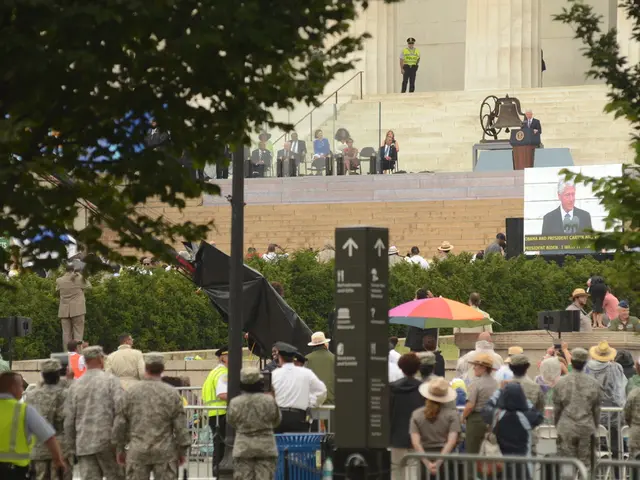Hamas firmly opposes disarming without the establishment of a Palestinian state.
In the heart of the Middle East, the conflict between Israel and Hamas in the Gaza Strip continues to unfold, marking a significant chapter in the long-standing Israeli-Palestinian struggle.
Hamas, an Islamic terror organization based in the Gaza Strip, has been a key player in this regional drama. The group, which does not recognise Israel's right to exist, claims all of historic Palestine, including the current state of Israel. This stance has been a major stumbling block in the quest for peace.
However, in a 2017 charter, Hamas accepted the establishment of a Palestinian state within the 1967 borders, encompassing the West Bank, Gaza Strip, and East Jerusalem. This seemed like a step towards peace, but the group's firm rejection of disarmament has kept the tension alive.
The turning point came on October 7, 2023, when Hamas and other Islamists kidnapped over 250 people from Israel, resulting in approximately 1,200 deaths. This act of violence sparked the Gaza War.
The Gaza War, which has claimed the lives of over 60,000 people over nearly 22 months, according to Palestinian reports, has been a source of global concern. The USA, under the leadership of its special envoy, Steve Witkoff, has proposed a plan to end the conflict. Witkoff met with the Geisel Families in Tel Aviv to discuss the plan, which aims to bring everyone home.
Despite this, Hamas firmly rejects disarming. The group's condition for disarming is the establishment of an independent Palestinian state with Jerusalem as its capital. This condition has been a point of contention among international actors, with some calling for Hamas's disarmament and exclusion from governing Gaza as prerequisites for peace and reconstruction.
The Arab League and key states such as Qatar, Saudi Arabia, Egypt, and Jordan have publicly demanded Hamas’s complete disempowerment and disarmament in Gaza, reflecting a historic shift in regional attitudes against Hamas. Even the Palestinian President Mahmoud Abbas, at the 2025 New York international conference focused on the Israeli-Palestinian conflict, condemned Hamas's violence, endorsed Hamas's disarmament, and said it should have no role in Gaza’s governance.
The United Nations and the League of Arab States also formally support disarmament of Hamas as necessary for achieving a ceasefire and political resolution. This demonstrates a broad international consensus that Hamas’s armed status is incompatible with the establishment of a recognised Palestinian state and peace process.
As the diplomatic pressure mounts, Hamas remains resistant to these demands. The future of the Gaza Strip and the Israeli-Palestinian conflict hangs in the balance, with the disarmament of Hamas emerging as a critical factor in the quest for peace.
The European Union, adhering to the UN Charter's principles, is advocating for Hamas's disarmament in the context of the ongoing Gaza War, recognizing that Hamas's armed status hinders the establishment of a peaceful and recognized Palestinian state. In the realm of general news and politics, this standoff between Hamas and the international community, particularly the EU, continues to be a significant aspect of the war-and-conflicts region.








